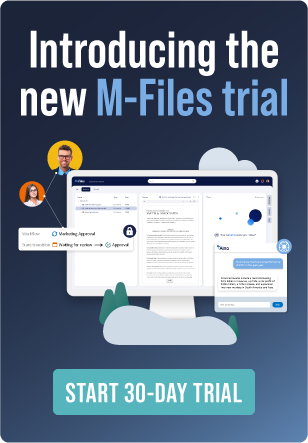Talent Acquisition and Retention: A Knowledge Work Automation Future

A shift is underway in talent acquisition and retention. Knowledge work automation is shaping the future of talent management and changing how businesses operate.
Knowledge workers across multiple industries grapple with the challenges of ensuring security and compliance while operating efficiently. Fast-paced environments require standardized processes and technologies to reach their business goals.
The Age of Digital Transformation
Cautious industries are gradually recognizing the potential of advanced technologies such as artificial intelligence (AI). AI makes data easier to understand, drives improved document management, tracks digital maturity, and improves security and compliance. Cloud-based AI will redefine talent dynamics and streamline business process management. Beyond conventional talent management, industries are embracing information technology and knowledge work automation. This evolution transforms a wide range of talent workflows.
AI automation software lead to a bright future where acquisition and retention efforts become automated processes. The response to evolving demands necessitates a departure from established norms, welcoming innovative solutions rooted in workflow automation.
The Transformation of Talent Acquisition
Talent acquisition, once relying solely on traditional methods such as job postings and recruitment agencies, has undergone a remarkable transformation with the advent of knowledge work automation. Today, businesses have access to tools and technologies that streamline the entire talent acquisition process end to end, from sourcing candidates to onboarding.
One of the key advancements in talent acquisition is the adoption of AI-driven algorithms. These algorithms can sift through vast amounts of data to identify potential candidates whose skills and experience align with the requirements of a given role. By automating the initial screening process, businesses can significantly reduce the time and resources spent on manual talent sourcing, allowing recruiters to focus their efforts on building relationships and engaging with top applicants.
AI can interact with candidates in real-time, answering their questions, scheduling interviews, and providing updates on the status of their applications. Not only does AI enhance the candidate experience by providing immediate assistance, but it also frees up recruiters' time to focus on more strategic tasks.
Predictive analytics has emerged as a powerful tool for talent acquisition, enabling businesses to anticipate hiring needs based on data and market trends. Through predictive analytics, businesses can address talent shortages and prepare for potential challenges in attracting and retaining top talent.
The evolution of talent acquisition, driven by knowledge work automation, has enabled businesses to streamline their recruitment processes, identify top talent more efficiently, and ultimately build stronger teams capable of driving organizational success in an increasingly competitive landscape.
The Future of Work in Talent Management
AI automation is redefining talent acquisition and retention practices, reducing costs by reducing churn. Workflow management is an effective way to manage work, especially in collaborative environments. It also helps retain talent by creating an organized workplace.
Industries are seeking new talent management methods with a focus on AI development, security, and compliance. Businesses must embrace digital transformation to succeed in hiring and retaining talented team members.
As industries navigate this profound transformation, flexibility becomes the cornerstone of success. Companies that automate workflows are more likely to succeed in a fast-paced, tech-driven world.
The synergy between human expertise and automated efficiency becomes a strategic advantage and increases productivity, fostering innovation and resilience. Knowledge work automation will augment the performance of knowledge workers.
Nurturing Talent Retention through AI Automation
While talent acquisition is crucial for building a skilled workforce, talent retention is equally essential for sustaining organizational growth and success. In today's competitive job market, where skilled workers are in high demand, businesses must prioritize strategies to retain top talent.
Knowledge work automation plays a pivotal role in nurturing talent retention by creating a work environment that fosters employee engagement, development, and satisfaction.
Automation achieves this by streamlining administrative tasks and reducing the burden of manual work on employees, allowing them to focus on more meaningful and fulfilling aspects of their roles.
For instance, automation can perform repetitive tasks such as data entry, report generation, and time-tracking, freeing up employees' time to concentrate on high-value activities that align with their skills and interests. By minimizing mundane tasks, automation helps prevent employee burnout and enhances job satisfaction, ultimately contributing to higher levels of retention.
Automation facilitates personalized learning and development opportunities for employees, enabling them to acquire new skills and grow within the organization. AI-driven learning platforms can analyze employees' skills gaps and preferences to recommend tailored training programs and career development paths, encouraging employees to take ownership of their professional growth and advancement.
AI can also play a vital role in fostering a culture of recognition and feedback within the organization. Automated feedback systems can provide timely recognition and constructive feedback to employees based on their performance, reinforcing positive behaviors and encouraging continuous improvement.
By leveraging knowledge work automation to streamline processes, personalize employee experiences, and foster a culture of growth and recognition, businesses can enhance talent retention and create a workplace where employees feel valued, engaged, and motivated to contribute to the organization's success.
The Broader Impact of Knowledge Automation Across Industries
Automated knowledge maintenance touches many fields, ranging from technology and healthcare to manufacturing and beyond. The seismic shift towards knowledge work automation is redefining how businesses approach talent acquisition and retention strategies.
Employers looking to continuously improve are embracing AI as an automation tool. Businesses are using digital technologies to change how they hire and work, which advances overall progress. Experts and groups can use an automation system to be more efficient plus find and keep skilled workers in the long term.
Embracing the Digital Transformation of Talent Dynamics
In this era of digital transformation, the reinvention of talent acquisition and retention practices extends beyond sectors and industries. The integration of knowledge work automation represents a cultural evolution in how organizations manage their workforce.
Digital disruption in the workplace concerns every stakeholder. Automating business processes makes people worry that AI will take over their jobs. This isn't the case.
Smart businesses use AI as a tool for talent management, not as a threat to job security. The integration of knowledge work automation signifies a paradigm shift—efficiency, security, and compliance converge to redefine talent acquisition and retention strategies.
Embracing emerging technology is a means for navigating the modern digital workplace. Those who embrace this evolution will lead the way in shaping the next era of talent acquisition and retention.
FAQ
Why should we use automation of knowledge work?
Automating knowledge simplifies tasks, freeing professionals to focus on solving more complex problems in their work.
How will knowledge management improve work performance?
Making information easier to access and promoting teamwork leads to smarter decisions, increased productivity, and a more adaptable workforce.
Why is automation of knowledge work disruptive?
It completes tasks traditionally performed by humans, leading to shifts in job roles, skills, and business processes.
How will knowledge management improve work performance?
Knowledge sharing will create easily accessible knowledge resources, leading to quicker and smarter decision-making.




